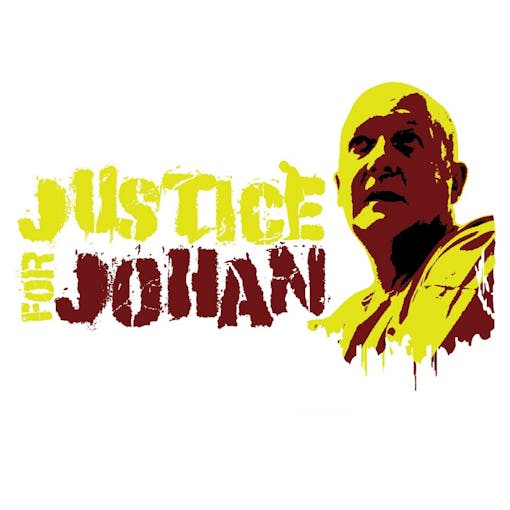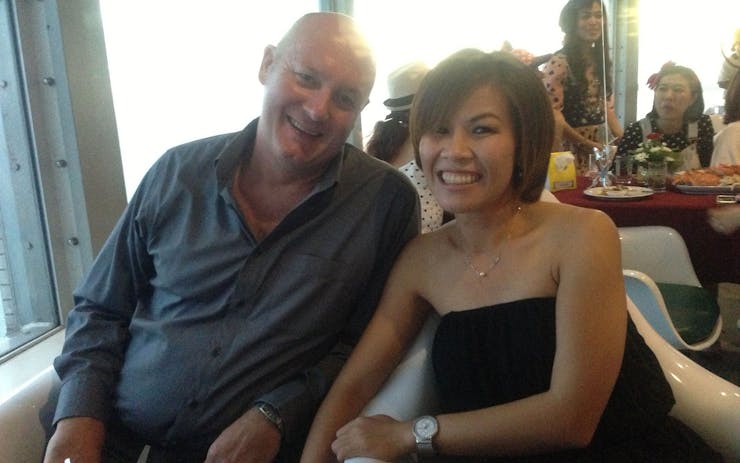Johan van Laarhoven, the Dutch cannabis coffeeshop pioneer who has been detained in Thailand for over five years on drug charges, returned to his native country on January 16. It’s a spectacular turn in a dramatic and closely watched saga—but Van Laarhoven is still not free. Neither is his wife Tukta.
After his arrival at Schiphol Airport in Amsterdam, Van Laarhoven, who has become a symbol of the Dutch government’s contradictory cannabis policy, was transported to a maximum security prison. Leafly first began covering his case in 2016.
The first Dutch cannabis coffeeshop chain
Johan van Laarhoven (59) is a self-made man in every sense. Back in 1981 he started selling cannabis in Tilburg, his hometown in the south of the Netherlands.
Over the years he built his operation, The Grass Company, into a chain of four first-class cannabis coffeeshops in Tilburg and Den Bosch. He sold the company in 2011 and retired to Thailand with his wife Tukta, a Thai citizen.
Disaster struck in the summer of 2014, when a large local police force raided Van Laarhoven’s villa in Phuket, Thailand. The Dutch expat and his wife were both arrested.
Johan was put in a 50 square-meter cell with 49 other inmates, infested with cockroaches and a bucket for a toilet. During the course of his subsequent trial it became clear what had prompted the raid.
Acting on a Dutch prosecutor’s orders
In the early summer of 2014, a Dutch prosecutor’s office sent a number of letters to Thai authorities informing them that van Laarhoven was under criminal investigation for large-scale drug dealing.
The prosecutor accused Van Laarhoven of tax evasion, money laundering and membership in a criminal organization.
Van Laarhoven always had licenses to operate his coffeeshops and followed all the rules of the globally famous Dutch tolerance policy.
Dutch authorities didn’t mention that Van Laarhoven always had licenses to operate his coffeeshops and followed all the rules of the globally famous Dutch tolerance policy. Nor did they mention that Van Laarhoven had never been convicted of any crime in the Netherlands.
When Thai officials chose not to act on the initial letters, the Dutch prosecutor went further, accusing Tukta van Laarhoven of complicity and literally asking the Thai authorities to start a criminal investigation into the couple.
2014 arrest, conviction
The fact that there had been a military coup in Thailand in May 2014, just weeks before the letters, didn’t seem to bother the Dutch prosecutor. He effectively accused Johan and Tukta van Laarhoven of being international drug dealers and insisted the military government arrest them.
The results were disastrous. Johan was initially sentenced to 103 years in jail, Tukta to 68 years.
‘Justice for Johan’
Johan’s brother Frans van Laarhoven, working together with the VOC, a Dutch NGO advocating for legalization of cannabis, started a campaign and website called Justice for Johan to bring him back home for a fair trial. (Full disclosure: The author of this article is a VOC founder.)
Only one member of the Dutch parliament took up the cause of Johan and Tukta, Vera Bergkamp of the liberal D66 party. But she did it with great determination and stamina.

Cannabis activists in the Netherlands started an international campaign to free the Dutch pioneer. (Courtesy of Justice for Johan)
2019 report: ‘not properly considered’
Largely thanks to Bergkamp’s continued efforts, the Dutch National Ombudsman investigated the Van Laarhoven case and published a critical report in March 2019. The Ombudsman concluded that the Dutch authorities had operated in a careless fashion: “The Dutch government has lost sight of the couple’s perspective. It was not properly considered whether the chosen means were proportionate to the chosen goal.”
The Ombudsman report proved to be a turning point. When Parliament debated the report in April 2019, justice minister Ferd Grapperhaus acknowledged that things had gone wrong. He promised to take action to bring both Johan and Tukta to the Netherlands.
Grapperhaus declared that he was deeply touched by a letter Johan had sent to him from his prison cell. In this letter, Johan wrote:
“We sleep here without a bed or mattress and we are forced to relieve ourselves in the cell. I live with thirteen other men in a cell of 11 m2. During the day it’s warmer than 40 °C. There’s all manner of vermin and a lot of violence. There’s hardly any adequate medical care.”
High-level negotiations
Grapperhaus made good on his promise and travelled to Bangkok last August to discuss the case with the Thai prime minister General Prayut Chan-o-cha and justice minister Somsak Thepsutin. The Dutch press reported last week how a Dutch team has closely cooperated with Thai officials since August to repatriate Johan van Laarhoven under an extradition treaty between the two countries.
And then finally, on January 16, exactly 2004 days after he was arrested, Johan was put on flight KL0876 from Bangkok to Amsterdam. He landed at Schiphol airport in the early evening and was transported to a maximum security prison in Vught, just twenty kilometers from his hometown of Tilburg. Because his wife Tukta is not a Dutch citizen, she remains incarcerated in Thailand.
Next: Fight the charges on home soil
So what will happen next? According to the extradition treaty, Johan has to spend 16 months of his remaining sentence in the Netherlands. His lawyers have already applied for a pardon, because of the extraordinary circumstances and background of the case.
Apart from the Thai sentence, the original Dutch criminal investigation is still ongoing. The prosecutor’s office said this week that they will continue Johan’s prosecution for alleged tax evasion, money laundering and membership of a criminal organization, now that he’s back home.
“A harsh public prosecutor,” responded Sidney Smeets, one of Van Laarhoven’s lawyers in a tweet. “Yet at the same time an opportunity for our client to prove his innocence and to show that his Thai detention as a result of the actions of ‘cheating prosecutor’ Van Delft was even more careless than the National Ombudsman showed in his report.”
Lawsuits are coming
At a press conference at Schiphol airport directly after Johan’s arrival, Gerard Spong, who has led the legal defense team since the beginning, told reporters there will certainly be a claim for damages, “with a lot of zeros.”
Johan’s lawyers started a summary procedure to demand he is taken to hospital, because of his bad health. During the proceedings on January 17, they read a note that Van Laarhoven wrote from his Dutch prison cell:
“My detention in Thailand has completely destroyed my life. I am not well, I can’t get my thoughts together. I’m sick of the fact that I have only seen my wife in court in the past five and a half years. My detention has broken me psychologically. This was not an accident, this was done on purpose.”
For more details on the Van Laarhoven case read Leafly’s original article, Cannabis coffeeshop pioneer asks Dutch king for rescue.




